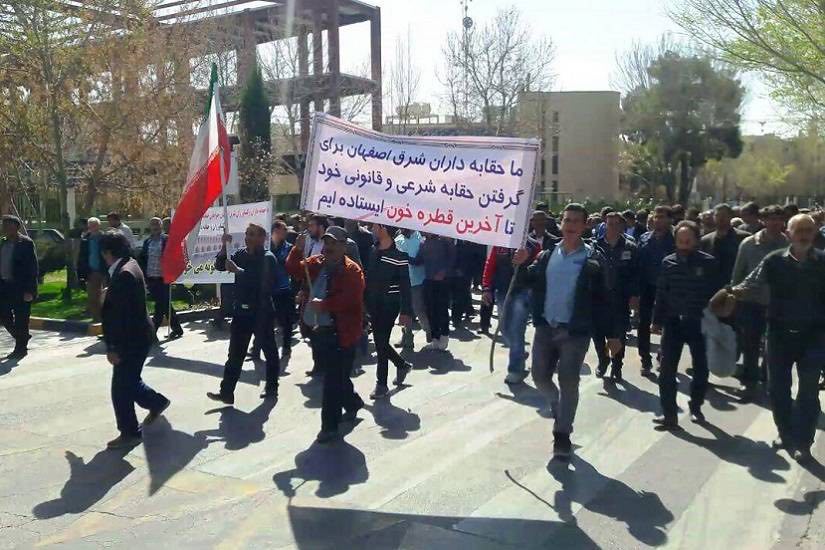Prediction of Water Wars in Iran
The prediction of water wars in Iran is very close. If previously water protests were specific to villagers, now they have reached city dwellers. If before, farmers did not have water for crop cultivation and environmental water rights were not fulfilled, now citizens do not have drinking water either. For years, farmers from the east of Isfahan have been holding protest gatherings due to the non-fulfillment of their water rights from the Zayandeh Rood.
However, in recent weeks, we have seen that first the people of Shahr-e Kord and now Hamadan have protested against the cut-off of piped drinking water. The water crisis in Shahr-e Kord has been resolved, but the situation in Hamadan is critical, and it is predicted that Yasuj city will also face a water outage crisis.
Issa Kalantari, the former head of the Environmental Protection Organization, said last year that the water war between the provinces of Isfahan, Chaharmahal and Bakhtiari, Yazd, Khuzestan, and Lorestan had started, and this war is spreading from province to province and village to village. It was previously announced that today’s water crisis in many cities of Iran has reached a warning stage.
Water consumption in Tehran, Arak, Isfahan, Shiraz, Qazvin, Qom, Karaj, Kerman, Mashhad, Hamadan, and Yazd has exceeded the water reservoirs in these cities, and 517 other cities have consumption equal to their reservoirs. The former Minister of Energy also said last year that he was worried about the increasing demand for drinking water because the government is unable to supply water continuously across the country.
Protests from Shahr-e Kord to Hamadan
IRNA reported that about 200 protesters in Hamadan were holding empty water bottles and chanting slogans against officials regarding this issue, demanding quick action to supply drinking water to the city. ‘Death to incompetent officials’ and ‘Incompetent official, resign, resign’ were among the slogans chanted by the protesters at this gathering.
According to the state news agency, police forces were also stationed at the protest site, trying to maintain order and disperse the people, asking the protesters to disperse and leave the area. It is said that the storage of Ekbatan Dam has decreased and is on the verge of going offline. Currently, water supply to city neighborhoods is being done through mobile tankers and the distribution of drinking water packages.
Last week, the people of Shahr-e Kord also held a protest gathering. On August 16, 500 people from Shahr-e Kord protested against the widespread water shortage in the city, holding placards and chanting slogans. In this gathering, people chanted slogans like ‘Born from the source, I am thirsty, I am thirsty’ and ‘Incompetent official, resign, resign.’
After the recent flood, the water from the Kouhrang source, which is the main water supplier for Shahr-e Kord, became muddy and undrinkable. Also, the intensity of the flood caused serious damage to the water transfer route. Although experts believe the issue is not just related to the muddy water.
Isfahan’s Water Rights Were Not Given
Farmers in the east of Isfahan have been facing a water crisis for years. They say they have lost not only their source of income but also their investments over the years. The last time, in the fall of last year, they camped in the middle of Zayandeh Rood near Khaju Bridge in protest, and the city’s people joined them. This public protest was recognized and covered by the state television for the first time, but within a few days, both the farmers’ camp was dismantled, and the city protests were countered.
Experts believe that when we remain indifferent to the occurrence of a water war and do not pay attention to global studies and do not take widespread action ourselves, the result is that our eyes open when we are in the middle of a crisis. Although experience has shown that our managers have never been accountable in the long term for their silence today.
Last year, Asia Times magazine wrote in a report that water scarcity in Iran is serious. It is known that officials tend to downplay the severity and scope of the various crises they face when confronted with opposition and public dissatisfaction. However, now Iranian officials have unusually sounded the alarm about the growing water crisis, a crisis that could lead to widespread conflicts over access to this vital resource in Iran. There was a time when the media headlined ‘The sound of water war comes from Isfahan’ and ‘The sound of water war comes from Khuzestan.’ Now it seems the sound of water war is coming from all over Iran.
Related articles have been published on Iran Gate regarding this issue.
- Forgotten Crises
- Water, Air, and Environment During War

